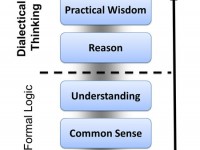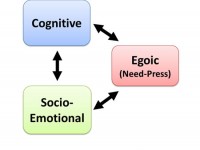In this course, students work with members of a team of their choice in order to better manage complexity with the aid of holistic and systemic, “dialectical”, thinking. Focusing on a central team task, they model for team members how to deepen collaboration and partnership in the team by closely listening to others’ task and interpersonal issues. In paying close attention to team discourse, they learn how to facilitate the untrammelled flow of ideas and proposals for solving both well-defined and heretofore ill-defined team problems. Helped by discussions in the study cohort, participants develop pertinent dialectical thinking exercises for their team, both to promote members’ interpersonal functioning and to reflectively deepen their approach to team tasks. They also help team members pay attention to the relationship of their own team to other teams with which they collaborate or compete in the organization. Students obtain a course certificate by submitting to the instructor a written free-form report (about 10 pp.) on how, under their guidance, the team has developed a greater aptitude for defining and pursuing topics and goals crucial for the team’s success. In the report, they spell out details of the results of their interventions during the duration of... Read More...
Author: Otto Laske
I am the founder and director of IDM, the Interdevelopmental Institute. My background is in philosophy, psychology, consulting, and coaching based on developmental theory to which I have mightily contributed myself. See the blogs at www.interdevelopmentals.org.
Case Study II: CDF Dimensions in their Interrelationship within a Client’s Unitary Consciousness
This program serves the sole purpose of deepening practical know-how of CDF by bringing together all of its three dimensions. Consequently, it presupposes both a social-emotional and cognitive case study as well as the ability to evaluate and give feedback on the outcome of the Need/Press Questionnaire. The program offers students the opportunity to show themselves and others that they have not only mastered “developmental theory”, but also know how to use it in practice. Writing a second case study involves: Completing a 1-hr social-emotional and 1-hr cognitive interview with a client other than the person engaged in Case Study I (a+b) Transcribing both interviews into English for discussion in the study cohort Evaluating the outcome of the psychological Need/Press Questionnaire Selecting from the social-emotional interview 15, from the cognitive interview 30 short fragments that appear to be structurally relevant for determining developmental profile Presenting a coding sheet of these fragments for each transcribed interview, to be evaluated by the cohort together with the instructor Submitting all materials required for written case study to the Director of Education Attending a feedback session with the Director of Education Giving full feedback to the client, both for self-insight and coaching Read... Read More...
From “Developmental Theory” to a Dialogical and Dialectical Epistemology
By Otto Laske - In this text, I focus on the central relevance of interviewing skills for being able to lead a structured developmental dialog in the sense of the Constructive Developmental Framework (CDF), whether social-emotional or cognitive. I want to make it clear that the certification as a Master Developmental Consultant/Coach at the Interdevelopmental Institute (IDM) is not a certification in practicing “developmental theory”, but rather an independent discipline derived from it, namely, a dialogical and dialectical epistemology. Developmental theory per se is taught at IDM only in applied courses which serve as a basis for learning the CDF epistemology, and in this sense are mere teasers for learning to think and listen developmentally, dialogically, and dialectically. What matters is not the theory, but its applications in work with human resources (“human capital”). This has always been the focus of IDM teaching. Abbreviations: CDF = Constructive Developmental Framework (Laske); DCR = Dialectical Critical Realism (Bhaskar); DSF = Dialectical Schema Framework (Basseches); DTF = Dialectical Thought Form Framework (Laske); IDM = Interdevelopmental Institute (Laske). *** When I started writing my two books on Measuring Hidden Dimensions in 2005, it was clear to me that the most progressive part of Kegan’s... Read More...
From AQAL to AQAT: Dialog in an Integral Perspective
By Bruno Frischherz - The background of this paper is a longitudinal study in adult development that is based on the structured interviewing required for using Laske’s Constructive Developmental Framework (CDF). In what follows, I will compare the CDF methodology with methodological tools offered by Integral Theory. Integral theory provides a helpful starting point for the analysis of themes and perspectives. But I will argue that integral theory is unable to fully account for the category of YOU that is fundamental in every dialog. Dialog is crucial not only for private communication but equally for scientific research, both in and between disciplines, as well as for professional practice. Given the limitations of Integral Theory, I am proposing a dialectical extension for AQAL which I call AQAT, meaning All Quadrants – All (dialectical) thought forms (context, process, relation, transformation). Download: Frischherz_2014_dialog_in_an_integral_perspective Read More...
Cognitive Fluidity – Its Etymology and Nuance
By Brendan Cartmel - The following article takes an important step, in my view, toward clarifying the relationship of Laske’s Dialectical Thought Form Framework to discussions of “integral thinking” in the sense of Wilber and his students. The article points to the gaps in what is called “integral” thinking relative to DTF and further differentiates what is concretely happening in using dialectical thought forms (DTFs). Otto Laske Background to Terms Cognitive Fluidity is the generative mechanism unlocking human potential and driving the evolution of human functioning; so says evolutionary anthropologist Steve Mithven. Cognitive and Social Intelligence are subsequent products of our Cognitive Fluidity. Mithven’s Cognitive Fluidity has correlates with JL Moreno’s idea of Spontaneity and Creativity being the main forces forming the cosmos and fluidising our cognition. What then are the origins of, and the concepts we imply, when we use the term Fluidity? Fluidity & CDF Dialectic Fluidity is a key metric in Otto Laske’s Cognitive Developmental Framework (CDF) and a key factor when designing Inter-developmental (IDM) consultation and coaching strategy. If Dialectic Fluidity is so important in understanding cognitive potential, what do we imply when we use the term Fluidity? What is the source of the term and... Read More...
Dialektische Textanalyse und Textentwicklung. Teil I
Von Bruno Frischherz - Die Dialektik hat als Kunst der Gesprächsführung und als philosophischer Denkansatz eine lange Tradition. Der vorliegende Beitrag zeigt, wie sich dialektisches Denken auch für die Analyse und Entwicklung von Texten nutzen lässt. Dialektische Textanalyse und Textentwicklung eignet sich insbesondere für Konzept- und Strategiepapiere, die einen hohen Anteil an abstrakter Denkarbeit verlangen. Der Schwerpunkt des ersten Teils des Beitrags liegt auf der dialektischen Textanalyse und ihrer Anwendung auf Strategiepapiere zur Green Economy. Die wichtigsten Werkzeuge der dialektischen Textanalyse sind die vier Klassen von dialektischen Denkformen, nämlich Kontext, Prozess, Relation und Transformation. Die dialektische Textanalyse erlaubt es, Denkformen in Texten zu beschreiben, zu messen und verschiedene Texte miteinander zu vergleichen. Die Textanalyse zeigt Stärken und Schwächen der Strategiepapiere aus dialektischer Sicht wie zum Beispiel Einseitigkeiten bei den Denkformen oder thematische Absenzen. Download: Frischherz_2013_Dialektische_Textanalyse_Teil_1 Read More...

